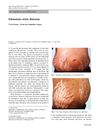January 2011 in “Liaoning Zhongyiyao Daxue xuebao” The traditional Chinese medicine treatment improved symptoms and was more effective for SLE patients.
 3 citations,
April 2012 in “Internal and Emergency Medicine”
3 citations,
April 2012 in “Internal and Emergency Medicine” The girl's swelling and skin issues improved with fluid restriction and diuretics.

A woman in Sri Lanka was diagnosed with lupus after presenting with protein loss from the gut and other symptoms.
1 citations,
August 2022 in “Frontiers in Physiology” Finasteride may help treat kidney disease caused by a high-fat diet by reducing harmful toxins and improving gut bacteria.
 25 citations,
November 2001 in “Kidney International”
25 citations,
November 2001 in “Kidney International” Male hormones worsen kidney transplant damage, but blocking them helps.
 10 citations,
May 2019 in “International Journal of Environmental Research and Public Health”
10 citations,
May 2019 in “International Journal of Environmental Research and Public Health” Finasteride may cause kidney damage.
 18 citations,
October 2021 in “Frontiers in Physiology”
18 citations,
October 2021 in “Frontiers in Physiology” Lipocalin-Type Prostaglandin D2 Synthase (L-PGDS) is a protein that plays many roles in the body, including sleep regulation, pain management, food intake, and protection against harmful substances. It also affects fat metabolism, glucose intolerance, cell maturation, and is involved in various diseases like diabetes, cancer, and arthritis. It can influence sex organ development and embryonic cell differentiation, and its levels can be used as a diagnostic marker for certain conditions.
January 2011 in “National Medical Frontiers of China” Elderly SLE patients show fewer typical symptoms and more hormonal side effects.
 3 citations,
June 2013 in “Turkish Journal of Rheumatology”
3 citations,
June 2013 in “Turkish Journal of Rheumatology” A 16-year-old boy with Castleman's disease and lupus was successfully treated and showed no recurrence.
November 2021 in “Frontiers in medicine” A patient with both bullous lichen planus and systemic lupus erythematosus showed improvement with treatment.
1 citations,
January 2023 in “Annals of Indian Academy of Neurology” Recognizing CVG can help diagnose systemic amyloidosis early.
 January 2021 in “ABC Heart Failure & Cardiomyopathy”
January 2021 in “ABC Heart Failure & Cardiomyopathy” A 90-year-old man was diagnosed with heart failure due to wild-type transthyretin cardiac amyloidosis.
January 2023 in “Journal of Integrative Medicine and Research” Vitiligo and lupus can occur together, requiring careful treatment to manage both conditions.
5 citations,
September 2018 in “International journal of genomics” Genetic mutations that disrupt homocysteine breakdown lead to increased damage in mouse hair keratin.
 1 citations,
February 2024 in “Medicine”
1 citations,
February 2024 in “Medicine” Eosinophilic cystitis is often misdiagnosed, but accurate diagnosis and treatment improve outcomes.
22 citations,
July 2016 in “Cellular and Molecular Life Sciences” Genetic changes in mice help understand skin and hair disorders, aiding treatment development for acne and hair loss.
 January 2025 in “Biomedical Reports”
January 2025 in “Biomedical Reports” Telitacicept helped stabilize complement levels in a patient with lupus and thyroid cancer.
18 citations,
January 2016 in “Journal of Clinical Medicine Research” A woman with lupus and severe nerve damage improved with specific treatments.
January 2022 in “Indian Journal of Paediatric Dermatology” A 13-year-old girl was diagnosed with juvenile lupus, showing only hair loss as a symptom.
10 citations,
November 2020 in “American Journal Of Pathology” Integrin β1 is crucial for liver structure and function, preventing fibrosis.
 April 2024 in “Rheumatology”
April 2024 in “Rheumatology” A young woman with visual issues and other symptoms was diagnosed with lupus and antiphospholipid syndrome, and improved with treatment.
 1 citations,
July 2022 in “BMJ Case Reports”
1 citations,
July 2022 in “BMJ Case Reports” A woman was wrongly diagnosed with lupus but actually had leprosy.

Hair loss can occur after treating diabetic ketoacidosis, especially with rapid weight loss and high soft drink intake.
 13 citations,
July 1996 in “Annals of Internal Medicine”
13 citations,
July 1996 in “Annals of Internal Medicine” International medical graduates outperformed U.S. graduates on an internal medicine exam.
 July 1996 in “Annals of Internal Medicine”
July 1996 in “Annals of Internal Medicine” International medical graduates scored higher than U.S. graduates on a medical exam.
 13 citations,
July 1996 in “Annals of Internal Medicine”
13 citations,
July 1996 in “Annals of Internal Medicine” International medical graduates outperformed U.S. graduates on an internal medicine exam.
 July 1996 in “Annals of Internal Medicine”
July 1996 in “Annals of Internal Medicine” In 1995, international medical graduates did better than U.S. graduates on a medical exam.
 8 citations,
July 1996 in “Annals of Internal Medicine”
8 citations,
July 1996 in “Annals of Internal Medicine” Itraconazole may cause low platelet and white blood cell counts.
 July 1996 in “Annals of Internal Medicine”
July 1996 in “Annals of Internal Medicine” Taking high doses of fluconazole for a long time can cause reversible hair loss.
 July 1996 in “Annals of Internal Medicine”
July 1996 in “Annals of Internal Medicine” Long-term high-dose fluconazole can cause reversible hair loss.


















